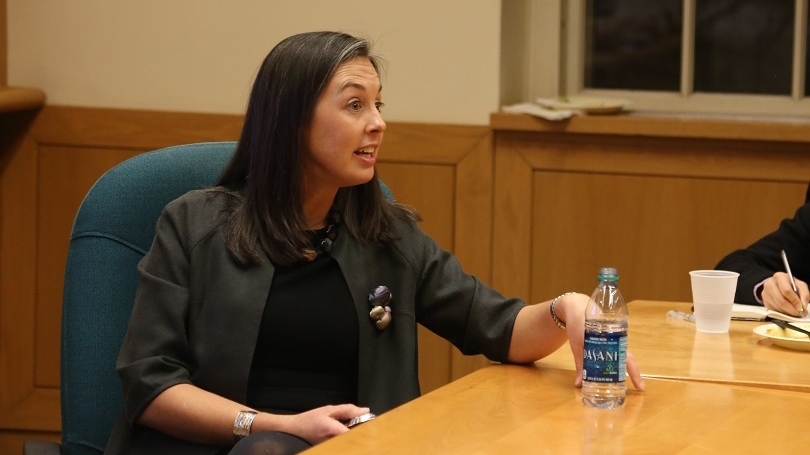
Menu
- Public Policy
- Leadership
- Funding
- News & Events
- About the Center
Back to Top Nav
Back to Top Nav
Back to Top Nav
Back to Top Nav
Kate Hilton ’99, a senior faculty member at ReThink Health, spoke to the Rockefeller Leadership Fellows on February 9, 2017. Kate is an expert in issues such as designing organizing efforts, teaching leadership skills, and strategizing with multi-stakeholder teams to take collective action.
Kate’s session began with a reading of her father’s high school graduation speech, as well as his eulogy. The two readings, although far apart in time, displayed the importance of consistency. Her father’s high school speech was focused on tolerance and the pursuit of vocational mastery. These themes were also clear in his eulogy, as his fellow doctors saw that his care for both patients and other doctors alike knew no bounds.
Kate then moved onto her definition of leadership, namely that leaders must enable others to achieve their purpose in an uncertain future. Using this frame, she depicted a few organizational models. For example, the dot-in-the-center model featured a central leader to whom all lower members reported to directly. This model contrasted with a hierarchical model, as well as one of complete anarchy. Although each had its merits, she ultimately decided upon a snowflake model, wherein a central leader dispersed power to several higher-ups, who in turn had followers of their own. The important distinction, however, was that the 2nd tier leaders could communicate directly with one another and each relationship between leader and follower was bidirectional, promoting a sense of equity.
Finally, Kate described the essential components of a “dream team”. These included agreed upon norms, enabling others to grow, outlining a shared purpose, and identifying individual strengths. RLF members brought their own examples of past teams that had followed these ideals, and others where group cohesion was lacking.
Overall, this session helped RLF members understand that both organizational structure and culture are precursors to effectiveness in a group setting. Norms must be made explicit and agreed upon. Their violation must result in some form of group punishment that dissuades future violations. This punishment need not be cruel but can rather be creative. It is simply essential that group members know when they erred so they can self-correct.
Written by Ben Rutan, Class of 2017 Rockefeller Leadership Fellow
This is part of an ongoing series of student reflections about the Rockefeller Leadership Fellows (RLF) program.